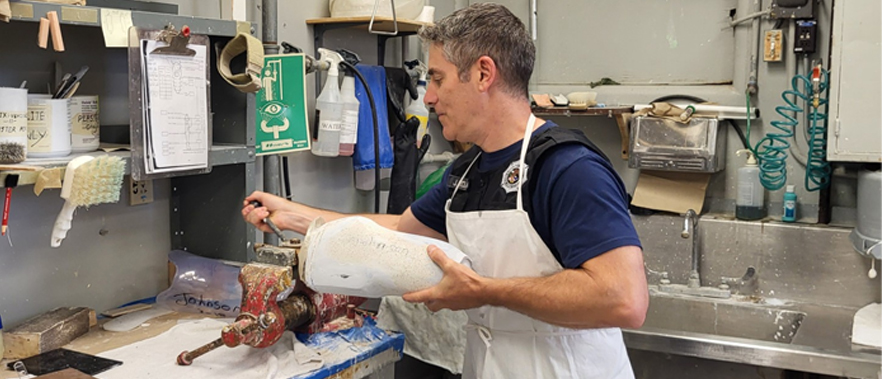(BOP) - Nestled inside the Medical Center for Federal Prisoners (MCFP) in Springfield, Missouri, a quiet but powerful transformation is underway. For over two decades, the Bureau of Prisons (BOP) has operated the only prosthetics lab of its kind within the federal prison system, providing vital care to incarcerated individuals across the country. The MCFP Springfield Prosthetics Lab is more than just a medical facility, it’s a pioneering example of innovation, rehabilitation, and efficiency that saves U.S. taxpayers $1.5 to $2 million annually.
Empowering Care Through Craftsmanship
At the heart of the lab's mission is its capacity to fabricate and repair prosthetic and orthotic devices entirely in-house. CAPT Justin Feola, the lab’s sole clinician, leads a team of trained inmate workers in producing high-quality prosthetics using advanced materials such as thermoplastics and carbon fiber laminate. These durable, lightweight devices are tailored to individual needs, offering improved functionality and reduced strain for the wearer. The lab's on-site capabilities, resizing sockets, replacing components, customizing fits, enable fast, personalized adjustments without outsourcing, greatly enhancing inmates’ mobility and quality of life.
Efficiency That Saves Millions
The financial impact is as substantial as its clinical achievements. By crafting devices internally and avoiding contracts with external providers, the lab significantly cuts expenses. It also reduces the need for security-intensive transfers to outside clinics, trips that would require escorts, transport coordination, and additional resources. Keeping care centralized within MCFP Springfield not only reduces cost and risk but also keeps services efficient and secure.
Telemedicine: Expanding Access and Streamlining Care
The lab further expands its reach through telemedicine. Using secure digital platforms, CAPT Feola consults with inmates at other BOP facilities, assessing prosthetic needs and guiding the fabrication or modification process remotely. This virtual care model means inmates can receive evaluations, adjustments, or even new devices without ever leaving their institutions. It’s a time-saving, cost-cutting innovation that makes expert care more accessible across the system.
Rehabilitation and Reentry: A Broader Impact
Perhaps the lab’s most transformative contribution lies in its role as a vocational training center. Inmates working in the lab gain hands-on experience in prosthetic design and repair. Through a rigorous 8,000-hour apprenticeship program, participants learn advanced techniques and prepare for a national certification exam. Those who pass receive credentials recognized across the prosthetics and orthotics industry, giving them a powerful tool for post-release employment. As CAPT Feola notes, the lab strives to meet three core objectives: equip inmates with functional devices, train them for post-release employment, and save government resources.
This dual impact, restoring physical mobility and fostering employability, mirrors the BOP’s broader mission to reduce recidivism. When individuals leave prison with tangible skills, certification, and improved physical health, their chances for successful reintegration and meaningful contribution to their communities rise dramatically.
